EU Has Circled Bulgaria on the Geopolitical Napkin
Adelina Marini, December 9, 2014
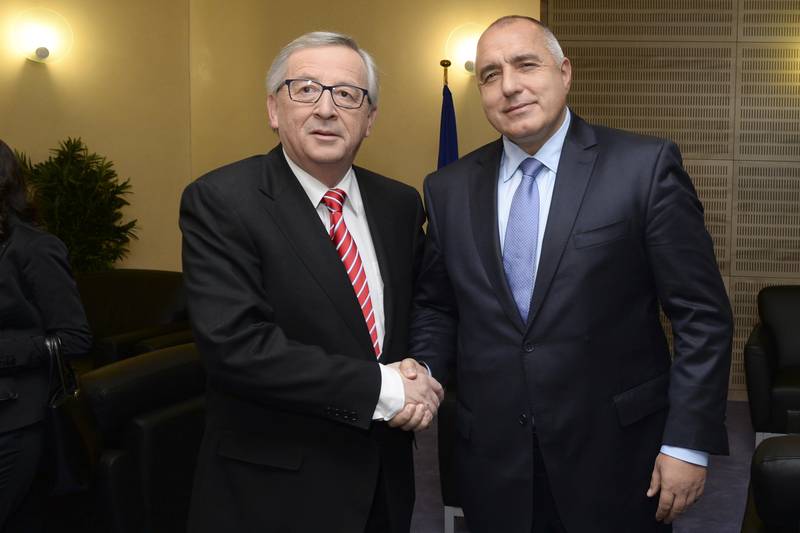 After so many years of controversy, pressure, disputes and uncertainties, a week ago Russia's President Vladimir Putin surprised everyone by announcing the end of the geopolitical energy project South Stream. The selection of place, the rhetorics used and the essence of his statement caused a wave of not less surprising reactions. On 1 December, in Ankara, Putin announced, according to many surprisingly even for his closest circle, that he suspends the project due to the European Commission's position which, in his words, did not favour the realisation of the project. The Commission's position was inconstructive and created obstacles along the way. "If Europe does not want to implement it, then it will not be implemented", Putin said. And although he spoke about Europe during the exchange of questions and answers with the surprised journalists, in his initial statement he pointed at Bulgaria as the main culprit for the suspension of the project.
After so many years of controversy, pressure, disputes and uncertainties, a week ago Russia's President Vladimir Putin surprised everyone by announcing the end of the geopolitical energy project South Stream. The selection of place, the rhetorics used and the essence of his statement caused a wave of not less surprising reactions. On 1 December, in Ankara, Putin announced, according to many surprisingly even for his closest circle, that he suspends the project due to the European Commission's position which, in his words, did not favour the realisation of the project. The Commission's position was inconstructive and created obstacles along the way. "If Europe does not want to implement it, then it will not be implemented", Putin said. And although he spoke about Europe during the exchange of questions and answers with the surprised journalists, in his initial statement he pointed at Bulgaria as the main culprit for the suspension of the project.
Russia did not receive the necessary permissions from Bulgaria and that was the reason why Moscow realised that there was no longer point in continuing with the project. "I mean that we now need to start the construction of this pipeline in the Black Sea, but we cannot do that until we have Bulgaria’s permission. I think it’s clear to everyone that it would be ridiculous to start the construction in the sea, reach the Bulgarian shore and stop. So we are forced to reconsider our participation in this project", Vladimir Putin said at a joint news conference with his Turkish counterpart Recep Tayyip Erdogan. Pointing a finger at Bulgaria in front of everyone, thus putting the country in the international headlines, caused a strong confusion in Bulgaria itself which has been for years torn by pro- and anti- positions on this issue. For years, Bulgaria has been subjected to strong pressure by Russia for South Stream (and other energy projects) as the culmination was earlier this year when the pro-Russian government of ex-PM Plamen Oresharski passed scandalous amendments to the legislation thus circumventing the third energy package of the EU, adopted in 2009.
The third energy package was one of the greatest achievements of the otherwise poor unity of the European energy policy. In spite of the obstacles and the controversy, the package was voted and its provisions have to be harmonised by 2015. The main goal of the package is to put an end to monopolism and the turning of energy into a tool of foreign policy. It demands breaking the monopoly of the gas supplier and the ownership of the pipelines. The package was at the focus of the negotiations between the EU and Russia before the summits between the two sides were suspended earlier this year due to Russia's annexation of the Ukrainian peninsula Crimea. No EU-Russia summit passed without Vladimir Putin or his temporary substitute on the post Dmitri Medvedev to raise the issue of mitigating the provisions of the third energy package.
Putin always believed that the known as "Gazprom Clause" in the package is "uncivilised". During the EU-Russia summit in December 2012, there was a very acute exchange of words during the then European Commission chief, Jose Manuel Barroso, and Vladimir Putin. Then the Russian head of state stated that the retroactive enforcement of the third energy package was violating Article 34 of the partnership and cooperation agreement which, as a matter of fact, expired in 2007. Barroso said, however, that the Russian companies were welcome on the European market but they should comply with the European rules "and this is important to understand". "We have rule of law and today it is part of the third energy package", Mr Barroso noted at the joint news conference after the summit in Brussels two years ago. In response, Putin said: "My good old friend Mr Barroso outlined his position so much in detail, so emotionally because he knows he is wrong ... Please, look at our agreement, Article 34. Read it", Putin demanded.
The article in question says the following: "The Parties shall use their best endeavours to avoid taking any measures or actions which render the conditions for the establishment and operation of each other's companies more restrictive than the situation existing on the day preceding the date of signature of the Agreement". The partnership agreement between the EU and Russia was signed in 1997 with an expiry deadline of 10 years. Russia announced that it no longer liked it and that is why in 2008 the negotiations on a new agreement began and before they were officially suspended they were difficult and proceeded slowly. The 1997 agreement is still in force because it is renewed each year. In the quoted by Putin article 34 it is also stated that when one of the parties does not stick to its commitments, the two sides should begin consultations.
Bulgaria - between the devil and the deep sea
Bulgaria has always been a weak link in the already weak common energy policy of the EU for several reasons. One is that the country never managed to settle the accounts with its past of a close Soviet satellite which even dreamt at some point of becoming the 16th republic of the USSR. That is why, the country is almost 100% energy dependent on Russia and in the past 25 years nothing has been done to change that. In Bulgaria, a major conductor of the Russian geopolitics is the Bulgarian Socialist Party (BSP), until recently led by the leader of PES Sergey Stanishev, which inherited without an analysis and condemnation the communist party. Every time when the BSP was in power, that was a revival for the Russian energy interests in the country. South Stream was not an exception. In 2010, during his visit in Sofia, when he signed an agreement for the establishment of the Bulgarian-Russian project company for South Stream with the then Prime Minister Boyko Borissov, Vladimir Putin said that the third energy package will be the main reason for the high energy prices in Europe.
The data of the European Commission, presented at the special taxation-energy European Council in May last year, show that this is not exactly so. The special map of the gas prices in EU shows that the formation of prices is very uneven and revealed a logic which is not in favour of Vladimir Putin's statements. The countries that use various sources of energy supplies enjoy tangibly lower prices of natural gas than those dependent on a single supplier. According to the Commission's map, Bulgaria is the country that pays the highest price for its gas - 43.3 euros per MWh. And all this despite the efforts of the pro-Russian forces in the country. The lowest price is paid by Britain - 22.9 euros per MWh.
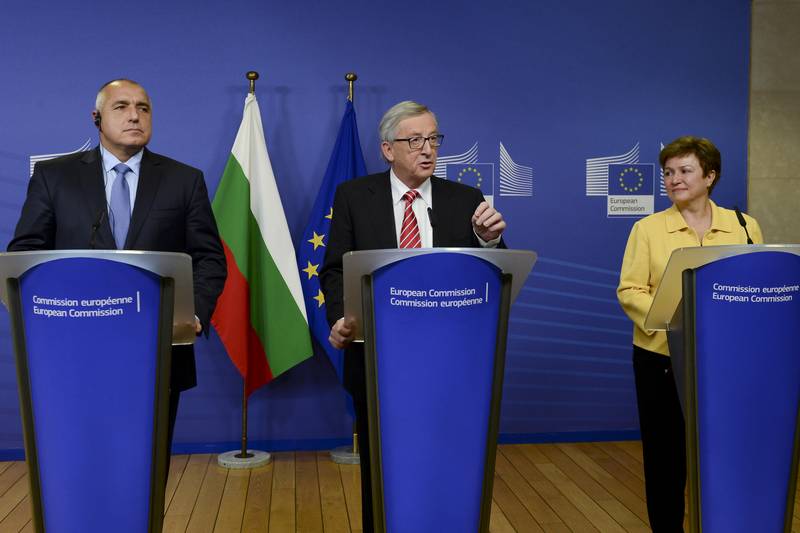 Not only that it pays the highest price for the natural gas from "friendly" Russia, but Bulgaria paid dearly for its unsettled relations with Russia and its past. The price is a rotten democracy, excessive Russian interference in the Bulgarian political life and stemming from that endemic corruption at the highest level that doomed the country to be the poorest in the EU. The existence of corruption and oligarchy, which reached their highest levels last year when they unleashed unprecedented in scale and continuity civil protests, are the main reason why in Bulgaria, even eight years after its accession to the EU, there is no rule of law. That is why, the country is still monitored by the European Commission under the Cooperation and Verification Mechanism which helped the country join the EU on 1 January 2007 together with Romania.
Not only that it pays the highest price for the natural gas from "friendly" Russia, but Bulgaria paid dearly for its unsettled relations with Russia and its past. The price is a rotten democracy, excessive Russian interference in the Bulgarian political life and stemming from that endemic corruption at the highest level that doomed the country to be the poorest in the EU. The existence of corruption and oligarchy, which reached their highest levels last year when they unleashed unprecedented in scale and continuity civil protests, are the main reason why in Bulgaria, even eight years after its accession to the EU, there is no rule of law. That is why, the country is still monitored by the European Commission under the Cooperation and Verification Mechanism which helped the country join the EU on 1 January 2007 together with Romania.
The story with South Stream is one of the best illustrations of the lack of rule of law. In June this year, the European Commission launched an infringement procedure against Bulgaria demanding the country to suspend the construction works on the pipeline because of doubts whether the awarded contracts were in line with the European competition rules. The public procurement for the construction of the Bulgarian section of South Stream took place in a record short time between Christmas and New year last year. This was sharply criticised by the UK ambassador in Sofia, Jonathan Allen.
A new Commission, a new European Council president, a new chance for the common energy policy
The fact that Vladimir Putin put Bulgaria at the centre of the energy geopolitics in Europe, practically represents a throwing of a napkin to the EU for redrawing the influence zones. The good news is that the new European Commission chief, Jean-Claude Juncker, immediately got the message and reacted accordingly. He spoke on 4 December in Brussels with the new/old Prime Minster Boyko Borissov for quite some time as the main topic of the talks was precisely South Stream or rather the consequences of its suspension. Jean-Claude Juncker, who is known for his remarkable skills to manoeuvre among different and often conflicting interests in the EU, made an incredible performance last Thursday which will be long remembered. He appeared in front of the journalists nimbly caressing the Bulgarian prime minster's egotism and entered entirely into the model of behaviour of the Bulgarian leader. This was a very important element of the scene because the former bodyguard of the late Bulgarian dictator Todor Zhivkov suffers from the same complex as Vladimir Putin.
He loves to be under the spotlight and to be recognised as a great politician. He has a black belt for karate and has quickly evolved during the transition period from a bodyguard to a chief secretary of the Ministry of the Interior during the governance of the ex-tsar Simeon Saxe-Coburg-Gotha, using the post to build a Hollywood image of a strong and fearless man. Boyko Borissov, just like Putin, likes to demonstrate his manhood and often lets the dependent on him media in his personal space - he can be seen topless with his latest fish catch or to demonstrate other physical skills. During his previous term as prime minster, he could often be seen at football stadiums with his favourite team or to play tennis with former tennis stars. It is always very important for Mr Borissov to have his photo taken next to celebrities, including politicians, which is part of his daily work. To him, the fact that he was congratulated formally for his re-election by the leaders of key countries like UK and USA is not a matter of protocol but of personal attitude and recognition for his personal skills. In the same time, however, his achievements in the fight against corruption at the high levels and the organised crime are null.
Jean-Claude Juncker, the veteran politician, who conducted tens of sleepless summits in the peak of the eurozone debt crisis, again demonstrated his skills by caressing the premier's ego and that of the Bulgarians, for that matter. He started with the words that Boyko Borissov was a very close friend of his. "We are friends, I could say close friends, we know each other for centuries", Mr Juncker said. A significant part of his statement was an improvisation, obviously aimed at Boyko Borissov's ego. The important message, however, he read from a piece of paper. "Bulgaria is part of the European family. Bulgaria has joined the EU years ago and Bulgaria has behaved like a founding member of the EU, so it was a real pleasure to discuss with the Bulgarian prime minister together with Vice President Kristalina Georgieva ...". This, by the way, was also a very important and an unusual element because according to the European legislation the commissioners are supranational. Nonetheless, Juncker said that he asked Ms Georgieva to attend the meetings and the news conference "because she informs me at the highest level about the developments in Bulgaria, although she does not represent the Bulgarian government in the Commission".
A very odd move, which was obviously also part of the idea to demonstrate Bulgaria's belonging to the European family in a way that can be understood in the Bulgarian society, stricken by pseudo nationalism. Juncker did one more thing that goes beyond the acknowledged in the developed nations protocol but which is common in dominated by a single person underdeveloped political societies. He used the presence of the Bulgarian media to address specifically the Bulgarian citizens and praised Kristalina Georgieva for doing her job very well. As if in response to the criticisms surrounding her nomination for member of the European Commission. In any other occasion, this would have beeen extremely humiliating and shameful, but not when it comes to the EU drawing its borders again (of its influence including), questioned by Russia.
Regarding South Stream, the EU entirely backed Bulgaria. Juncker said that this project can be built but according to the European legislation. "The ball is in the court of Russia. We are ready. Preparatory work is on the way", he said. Prime Minster Borissov said that putting Bulgaria at the centre of the events was intentional. He was confused and the main focus of his statement was that Bulgaria had empowered the Commission to negotiate on its behalf and that it was doing this on behalf of all the participating countries in this project. Boyko Borissov's statement made it clear that Bulgaria does not want to be a problem in Russia's eyes because this would have devastating consequences for the already suffering Bulgarian economy.
Bulgaria is not alone and the EU is not only an observer, Jean-Claude Juncker said. EU and Bulgaria are working together to resolve the legal issues which are not insurmountable. "We should do what is best for Bulgaria and thus best for Europe", the European Commission chief added and untied the purse. The Commission is unblocking all the suspended operational programmes, blocked during the pro-Russian government led by Plamen Oresharski. Kristalina Georgieva also said that during the meeting were discussed ways Bulgaria to take the best possible advantage from the investment plan Jean-Claude Juncker presented on 26 November in Strasbourg, "so that Bulgaria is among the first on the queue when it comes a reality". This was a very important statement because it shows that Bulgaria will receive a special treatment. As Juncker's investment plan envisages investments mainly in strategically important for the EU projects, this means that Bulgaria's energy dependence will be viewed as a priority. This is one of the good news from the meeting which was, in fact, an inclusion of Bulgaria in the EU's area of influence on the geopolitical napkin, formulated very directly by Kristalina Georgieva:
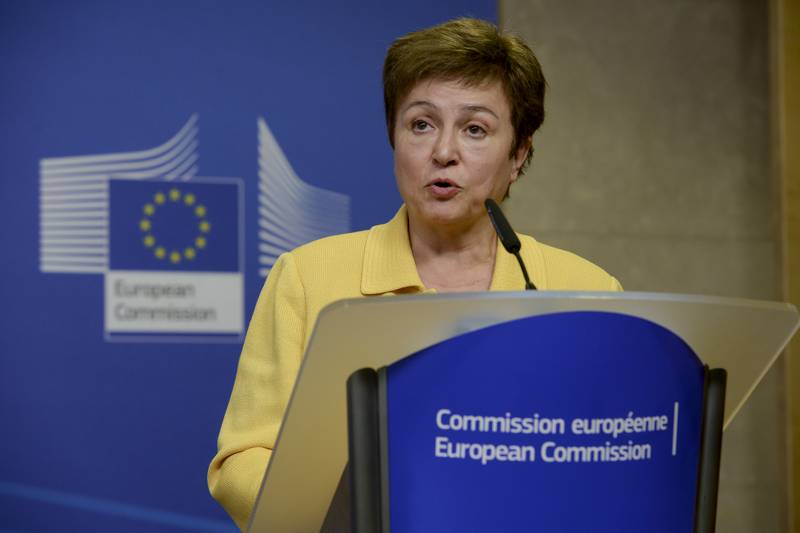 "I would like to say very seriously and responsibly that, especially in such a difficult time when Bulgaria ended up pressed with very big political and economic damages, we in the European Commission feel a great responsibility to work with Bulgaria so that it can fully take advantage of its membership in the EU". Apart from loosening the purse, the Commission also commits to remove all the existing restrictions that made of Bulgaria a second-hand member of the EU. Jean-Claude Juncker promised that during his term the Cooperation and Verification Mechanism will be abolished. He refused to say what will be the conditions for that, but made a strong appeal Bulgaria to finally join the Schengen security space. "To me, Bulgaria is not like any other country and I hold on it very much. I am connected to it. I have brotherly relations with the prime minster and I will do my best so that Bulgaria can find the place it deserves in Europe".
"I would like to say very seriously and responsibly that, especially in such a difficult time when Bulgaria ended up pressed with very big political and economic damages, we in the European Commission feel a great responsibility to work with Bulgaria so that it can fully take advantage of its membership in the EU". Apart from loosening the purse, the Commission also commits to remove all the existing restrictions that made of Bulgaria a second-hand member of the EU. Jean-Claude Juncker promised that during his term the Cooperation and Verification Mechanism will be abolished. He refused to say what will be the conditions for that, but made a strong appeal Bulgaria to finally join the Schengen security space. "To me, Bulgaria is not like any other country and I hold on it very much. I am connected to it. I have brotherly relations with the prime minster and I will do my best so that Bulgaria can find the place it deserves in Europe".
This is, in fact, the bad news, because, due to the geopolitics, Bulgaria will again have no chance to reform itself and to turn into a rule of law country. The abolishment of the humiliating mechanism, which is the main reason why its membership in Schengen is blocked, is aimed at mitigating the strongly gaining power eurosceptic forces in Bulgaria. The Commission has been saying the same things for years, it has been pointing its finger at Bulgaria, but to no avail. It used to block the EU funds from time to time, but instead of unleashing a change it is fuelling the eurosceptic forces which are in their essence pro-Russian. In this sense, the EU's reaction is very belated which is why the price will be too high. The abolishment of the mechanism means that the Commission will lose its only leverage to influence at least on the public opinion. Nothing is lost yet, however, because the new Commission has committed to continue the work on the proposed by the previous Commission rule of law mechanism and the fact that Juncker's right hand is responsible precisely for the rule of law and the fundamental rights is to some extent calming. Also encouraging is the fact that the new government in Bulgaria has a dedicated deputy prime minster responsible entirely for the mechanism. This is the former EU commissioner Meglena Kouneva.
The geopolitical developments have taken the slow process of integration in the EU out of track. Juncker's Commission has the uneasy task to play out this challenge in a way that would solve the problems not create new ones. At this stage, Jean-Claude Juncker seems to care only for repulsing the Russian attacks on EU member states. "I do not accept the simple idea that Bulgaria can be blackmailed when it comes to energy connections. Bulgaria is not a corrective factor in the EU-Russia relations. We will undertake and have already undertaken all the necessary steps to ensure that our relations with Russia will be improved. But this does not depend only on EU's or the Commission's desire. As you know, a tango needs two", he said at his press conference with Boyko Borissov.
The EU has made the first step - to declare its commitment to Bulgaria. Now, Bulgaria too needs to do its homework. The best way the country to break with the Russian grip is by working on its independence. This means not only diversifying the energy sources but also creating rule of law which is the best defence against Russia. As Jose Manuel Barroso said two years ago: "We have rule of law and it is now part of the third energy package". This is precisely the policy the EU is applying in its attempts to ensure that Ukraine will be able to decide on its own which area of influence it wants to be part of - radical reforms, fight against corruption and oligarchy, establishment of rule of law.
The lesson from this whole story is that Bulgaria was very humiliated. The Russian president said in Turkey that "Bulgaria is deprived of the opportunity to act as a sovereign nation" and recommended the Bulgarian authorities to "at least demand money from the European Commission to compensate for their lost profits". And this is what Bulgaria did - it demanded money. Juncker played a very humiliating performance but gave the money. In the same time, it became clear that the meeting between Mr Borissov and EPP chief Joseph Daul was joined by the leader of PES Sergey Stanishev which is a strong signal that the EU will work at all levels to ensure Bulgaria's stay in the European area of influence.
From now on, the country has to decide what it should do to put an end to this humiliation. Bulgaria has already made its choice and that is the membership in the EU. It is not a matter of deprivation of sovereignty, but as Mario Draghi put it, it is a sharing of sovereignty. Ukraine did the dirty work for the EU and Bulgaria and now Bulgaria has a chance to take advantage of its membership and stop being the poorest EU member by adopting the European values as much as possible and stop playing the dual game. Boyko Borissov said in Brussels that Bulgaria was the poorest because of the sanctions against 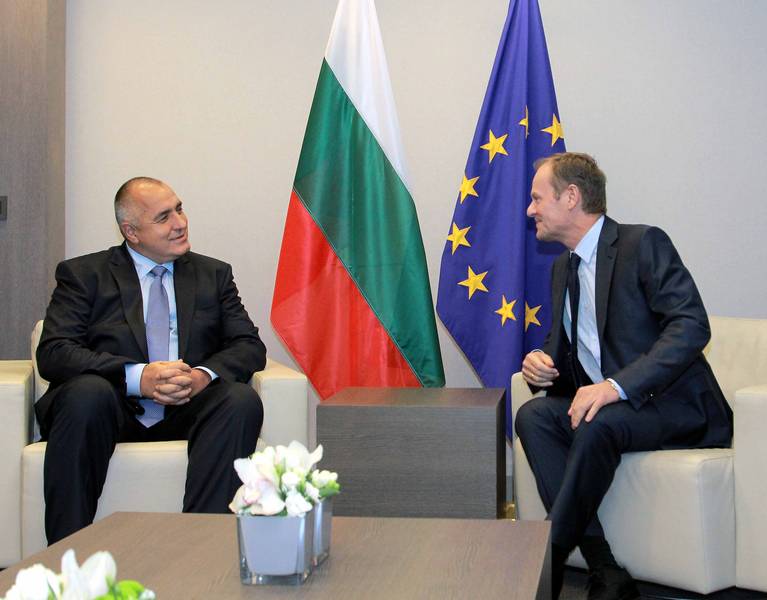 former Yugoslavia some 20 years ago and hinted that the current conflict with Russia also deprives the country of chances for prosperity. Moreover, he made a scandalous statement by saying that Bulgaria was unable to export on the EU market and depended only on the Russian market and the Russian tourists. This is a recognition that in the past 8 years Bulgaria was only ostensibly a member of the EU. Boyko Borissov knows very well that his statement about external forces being guilty for Bulgaria's poverty is not true. And the Bulgarian voters should understand that very well. Otherwise, they are doomed of being humiliated time and again.
former Yugoslavia some 20 years ago and hinted that the current conflict with Russia also deprives the country of chances for prosperity. Moreover, he made a scandalous statement by saying that Bulgaria was unable to export on the EU market and depended only on the Russian market and the Russian tourists. This is a recognition that in the past 8 years Bulgaria was only ostensibly a member of the EU. Boyko Borissov knows very well that his statement about external forces being guilty for Bulgaria's poverty is not true. And the Bulgarian voters should understand that very well. Otherwise, they are doomed of being humiliated time and again.
Vladimir Putin's decision to suspend South Stream is a very good opportunity to finally build a genuine energy union. The EU should not waste any more time because it might not get another chance. So far, South Stream, although unrealised, proved to be geopolitically very successful - it divided the EU at a time when the Union has realised that it needed internal consolidation. The Commission has already committed, according to the member states' guidelines to work for an energy union but the capitals should once and for all turn their backs on their national egoism and unite. As South Stream made it perfectly clear - when united the EU is strong.
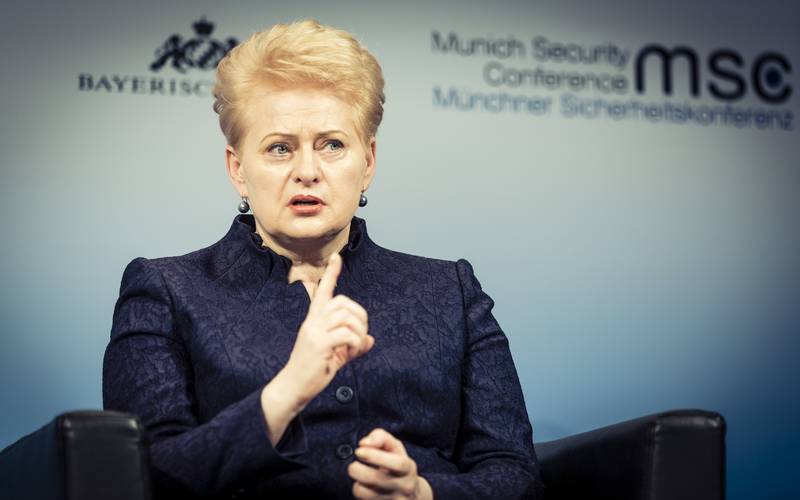 Dalia Grybauskaite | © MSC/Koerner
Dalia Grybauskaite | © MSC/Koerner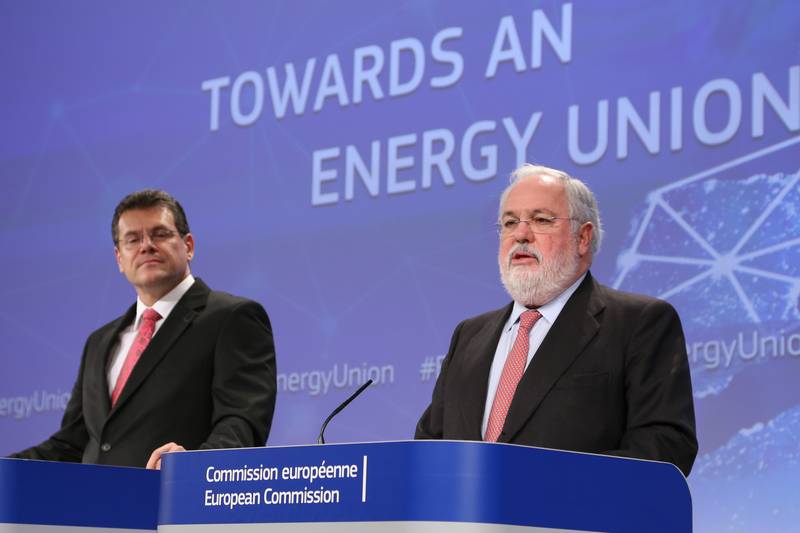 Maros Sefcovic, Miguel Arias Canete | © European Commission
Maros Sefcovic, Miguel Arias Canete | © European Commission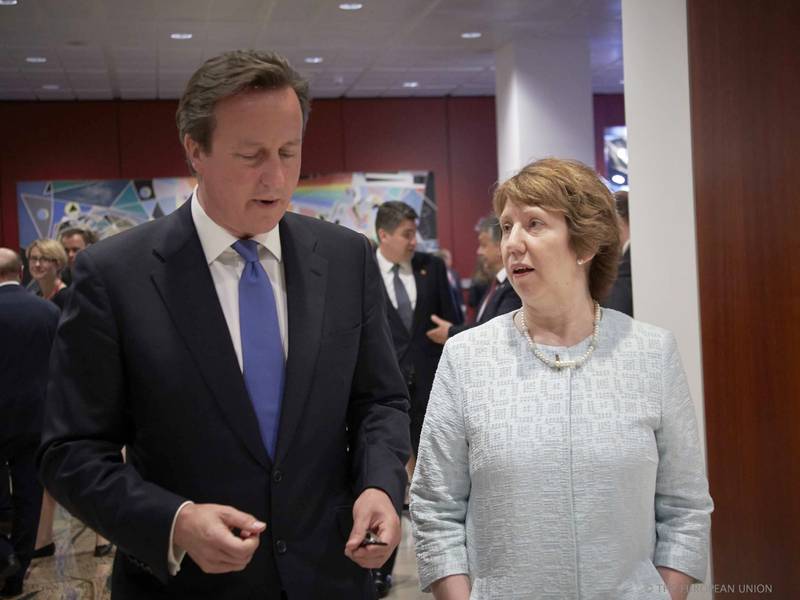 David Cameron, Catherine Ashton | © Council of the EU
David Cameron, Catherine Ashton | © Council of the EU